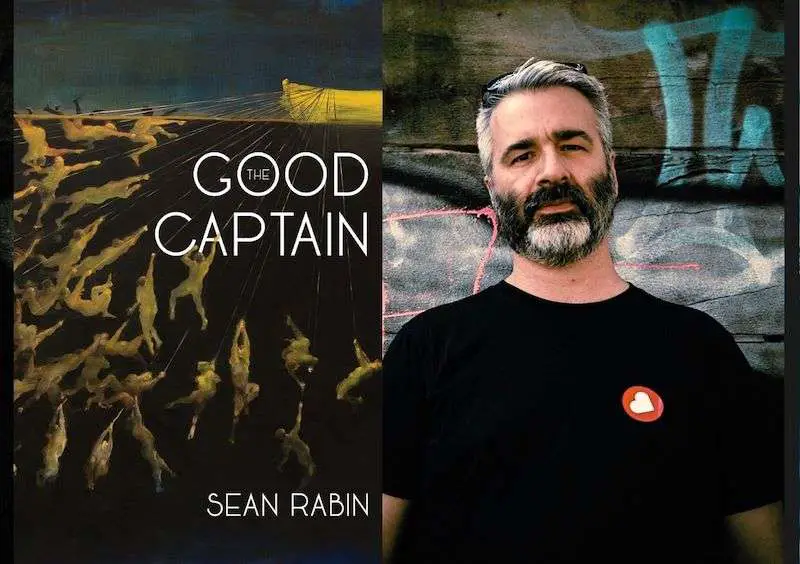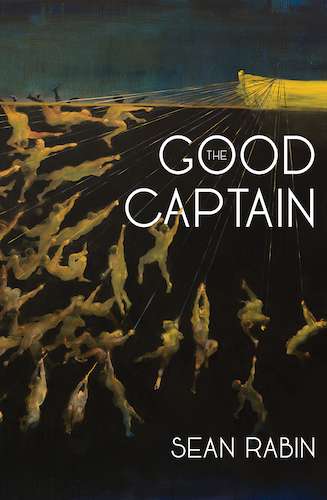Sean Rabin’s inspiration for cli-fi thriller The Good Captain
Today we welcome author Sean Rabin, author of new novel The Good Captain, to share with us what inspired him to write this ‘cli-fi’ thriller.

Disclosure: If you click a link in this post and make a purchase, I may earn a small commission.
What inspired Sean Rabin to write The Good Captain
The Good Captain started more than 20 years ago on a tiny Greek island called Halki. My wife and I needed a break from London and the prospect of an island renowned for its lack of nightclubs and bars sounded perfect – swimming, scrabble, eating and reading for two weeks.
The holiday was great, but one unanticipated experience was snorkelling in water that was completely devoid of all marine life. And I mean empty! Nothing but rocks and sand. After growing up in Australia where schools of fish swim between your legs as you wait for the next set of waves to approach, the depleted state of the Mediterranean Sea came a devastating shock.
I would spend the next 15 years reading about the effects of industrial fishing, aquaculture and plastic pollution, while at the same time spoiling countless dinner parties by discussing the state of the ocean and its intrinsic link to the health of our planet.
As well as teaching me how to avoid dinner parties, this practice also revealed how little people knew about the fish on their plate and where it came from – despite the countless books written on the subject. But these books, I realised, were all non-fiction, and easily ignored unless you were interested in the subject.
I eventually reached at the understanding that a different information pathway was required, and perhaps a gripping story in the vein of The Cruel Sea or Das Boot might make it easier for people to encounter and digest what I believe is vital information to humanity’s continued existence.
As someone who grew up near a Tasmanian beach – dreaming of becoming a marine biologist – I find it shocking and heartbreaking that 90 per cent of the world’s fisheries are fully fished or overfished, and that some studies suggest if we continue on this path there will be no fish left by 2050.
~
It was the idea of an empty ocean in my lifetime that made me write The Good Captain. How could I explain the loss of fish to my son? My grandchildren? I couldn’t face the shame of admitting I had done nothing to try and prevent it.
“I wanted to write a book to show people what an empty ocean might look like, and what people might do to save it.”
The wider I read about the environment the more I also encountered different concepts of storytelling, and in particular the idea that humanity is not the only story occurring on this planet.
There are stories in the wind, the sea, the rain, the mountains, the trees, in every animal, and once upon a time people listened to them to gain a deeper understand the world – which is why texts such as The Odyssey give the environment such a large role to play. But the further we’ve moved away from nature the less we’ve listened to these voices – creating stories solely about humans that reassure us we’re safe from the random dangers of the natural world.
Recent floods and bushfires prove this to be a lie – an illusion – and humanity is just one of many stories taking place on our blue planet. I wanted to convey this by making the sea a character – with a language of its own that might be read and understood if someone paid close attention to it.
In the end, I envision The Good Captain as a call to arms. Not everyone can go to sea or change governmental policy, but we can all begin to care about something bigger than ourselves, and we can all learn to listen to the sea – to our planet – and adjust our behaviour before we become the monsters of our grandchildren’s nightmares.
The Good Captain Book Synopsis
Set in the near future – during a time of plummeting fish stocks, toxic algae blooms and jellyfish swarms – The Good Captain follows a group of radical environmentalists committed to a mission of extreme civil disobedience against the powers threatening to destroy the last of the world’s marine life.
Led by the wild Rena – born and raised by the ocean – the characterful crew engages in a high seas drama that contains all the thrill of a cat-and-mouse seafaring classic, while at the same time offering a timely warning for the political classes that their negligence will not go unpunished.
Evoking a disturbing vision of what the world might soon become – random, dangerous, surprising and sometimes even miraculous – The Good Captain is a gripping, confronting and truly unique novel.
‘If you care about the ocean, about extinction, about deforestation you’ll find yourself immersed in this novel. With originality and wit, Sean Rabin asks “how far is too far?” when you’re fighting to save the planet.’ – JANE RAWSON, Author of The History of Dreams and From the Wreck
(Transit Lounge Publishing, April 2022)
Get your copy of The Good Captain from:
Booktopia AU Amazon Transit LoungeAbout the Author, Sean Rabin
Born in Hobart, Tasmania, Sean Rabin has worked as a cook, script reader, copy-editor, freelance journalist and librarian. He has lived in Ireland, Italy, London and New York, and now resides in Sydney, Australia. His debut novel Wood Green (Giramondo) was shortlisted for The Victorian Premier’s Literary Awards 2017 and The Readings Prize for New Australian Fiction 2016 and was also longlisted for the ALS Gold Medal. It was published in the UK by Dodo Ink in 2016.
Reviews of The Good Captain
“Although set in the near future, many of the book’s surreal scenes – such as floating islands of plastic – are already a reality. Rabin’s world-building is most compelling when it elaborates on the grim future of our oceans.” – Stephanie King, Readings
“The Good Captain is a novel written with passion, projecting a future that seems impossible to endure while also depicting an obdurate political refusal to act in time to prevent total disaster.” – ANZLitLovers

